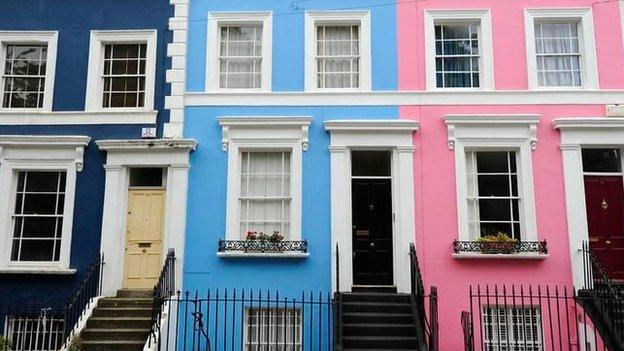UK house prices up 8% in a year, says ONS
- Published

Activity in the housing market varies in different parts of the country
UK house prices rose by 8% in the year to the end of March, official figures show, as the prime minister says he will consider changes to Help to Buy.
The annual increase slowed compared with a 9.2% year-on-year price rise to the end of February.
However, the latest official data from the Office for National Statistics (ONS) showed that the annual property price increase in London stood at 17%.
Excluding London and the South East of England, prices were up by 4.7%.
The wide range of activity was shown with prices in Northern Ireland increasing by 0.3% on a year-on-year basis, and by 0.8% in Scotland.
In the East of England, property prices were up by 6.6% annually, and by 6.1% in the South East of England.
Help to Buy
The ONS said that prices fell by 0.5% in March compared with February, matching other surveys, making the average home worth £252,000. This was the first month-on-month drop for over a year.
However, house price data from the Halifax and Nationwide, based on their lending, have also shown fairly sharp rises in prices on average over the last year, despite the regional differences.
This has prompted some commentators to call for the second phase of the government-backed Help to Buy scheme in the UK - which supports new homebuyers who might have struggled to get a mortgage - to be scaled back.
Prime Minister David Cameron told the BBC: "Of course, we will consider any changes that are proposed by [Bank of England governor] Mark Carney.
"But, as he said, this is a well-targeted scheme and it has helped tens of thousands of people get on the housing ladder and to have mortgages."
The shadow chancellor, Ed Balls, said the Help to Buy scheme was simply too high: "We've said it should come down much closer to average house prices. A number below £400,000 would make much more sense than £600,000 which is far too big a house price for the taxpayer to be guaranteeing mortgages. "
The Treasury minister - Andrea Leadsom - said there were a number of issues for the government to consider: "The thing is it's a fine balance. In London prices are rising quite fast. In the rest of the country - and in the country as a whole - they remain 15% in real terms below their pre-crisis peak. "
Rate fear
Mr Carney said he was watching the housing market closely. Although there was a shortage of homes, which the Bank could do nothing about, it did have influence on lenders and would tell the chancellor if changes needed to be made to the government's housing market schemes.
Mortgage rules have been altered recently, that is thought to be lengthening the time it takes to get a home loan. This has reduced the number of mortgage approvals in recent weeks.
The Bank of England also has the power to control interest rates, and a separate report suggests a rise in the Bank rate could hit hundreds of thousands of mortgage holders hard.
The Resolution Foundation estimates that 770,000 vulnerable households could be "imprisoned" by a limited ability to switch to another mortgage deal were interest rates to rise. That represents about one in 10 mortgage holders in the UK.
The Bank rate is at a record low of 0.5%, but analysts are predicting a rise in the rate at some point in 2015.
"Many borrowers have enjoyed spectacular savings over recent years, with mortgage rates falling to historic lows, and most will be able to ride the tide of gradually rising interest rates," said Matthew Whittaker, chief economist at the Resolution Foundation and author of the report.
"But for around one in four, even modest rate rises could create financial difficulties. Those at greatest risk are members of this group who also find themselves unable to access the best deals in the market today.
"Almost one in 10 households are doubly exposed: facing the prospect of their mortgage becoming increasingly unaffordable in the future and with the market offering them limited, if any, choice today."
The report suggested that homeowners in London and eastern England were most exposed to an interest rate rise.
The cost of living, as measured by the Consumer Prices Index, rose to 1.8% in April from 1.6% in March. This was the first rise in inflation for 10 months and pushed the annual change in prices slightly higher than the annual change in average earnings.